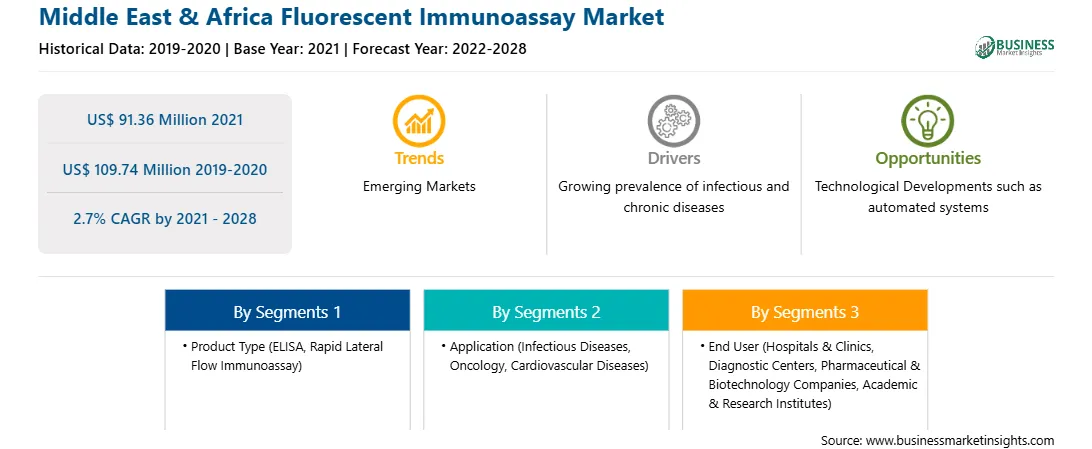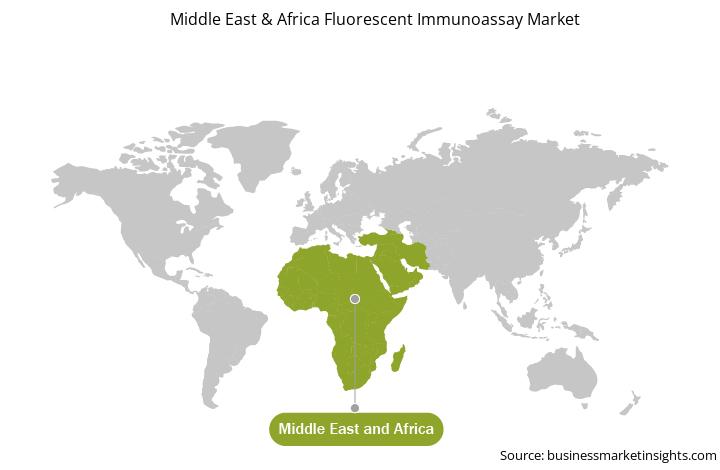The MEA fluorescent immunoassay market is expected to grow from US$ 91.36 million in 2021 to US$ 109.74 million by 2028; it is estimated to grow at a CAGR of 2.7% from 2021 to 2028.
Human blood is an essential medical detection index. With the development of clinical medical detection instruments and detection technologies, the requirements for detection accuracy and efficiency have been gradually improved. Early diagnosis and complete surgical resection offer the best prospects for curative cancer treatment. Fluorescence immunochromatography is a new detection technique. It is characterized by high efficiency, convenience, no pollution, and a large detection area. Human blood can be rapidly detected using fluorescent immunochromatography. The concentration of pathogenic factors (cancer cells) in human serum can be conveniently and accurately measured. The system integrates many peripheral modules, including fluorescence signal acquisition, processing, quantitative curve fitting, and test results. The translation of laboratory science into effective clinical cancer therapy is growing significantly. Understanding cancer cell surface receptors, cancer cell growth, and cancer metabolic pathways have led to many promising molecularly targeted therapies and cancer gene therapies. In the laboratory setting, fluorescence imaging (FI) and bioluminescence imaging (BLI) has long been used in preclinical research to quantify tumor mass, assess tumor targeting by experimental drugs, and distinguish between primary and secondary effects of cancer treatments. Many cancers, including breast, colon, and skin cancer, spread to lymph nodes that have significant prognostic and therapeutic implications. Fluorescent dyes have long been used in this endeavor. The dye is injected near the primary tumor; fluorescence detection then identifies the first group of nodes to which the lymph travels. These lymph nodes are called sentinel lymph nodes and are biopsied because they are the most likely to have cancer. Therefore, the rising number of cancer cases worldwide and the growing need for early detection are expected to provide growth opportunities for the fluorescent immunoassays market.
With new features and technologies, vendors can attract new customers and expand their footprints in emerging markets. This factor is likely to drive the MEA fluorescent immunoassay market at a notable CAGR during the forecast period.
MEA Fluorescent Immunoassay Market Revenue and Forecast to 2028 (US$ Million)
MEA Fluorescent Immunoassay Market Segmentation
The MEA fluorescent immunoassay market is segmented into product type, application, end user, and country. Based on product type, the market is segmented into ELISA, rapid lateral flow immunoassay, and others. The ELISA segment dominated the market in 2021 and is expected to be fastest growing during forecast period. Based on application, the market is segmented into infectious diseases, oncology, cardiovascular diseases, and others. The infectious disease segment dominated the market in 2021 and is expected to be fastest growing during forecast period. Based on end user, the market is segmented into hospitals & clinics, diagnostic centers, pharmaceutical & biotechnology companies, academic & research institutes, and others. The hospitals and clinics segment dominated the market in 2021 and is expected to be fastest growing during forecast period. Based on country, the MEA fluorescent immunoassay market is segmented into South Africa, the UAE, Saudi Arabia, and the Rest of MEA.
Abbott, BD, bioMerieux SA, Danaher, F. Hoffmann-La Roche Ltd., Ortho Clinical Diagnostics Holdings plc, Quidel Corporation, Siemens AG, Sysmex Corporation, and Thermo Fisher Scientific Inc. are among the leading companies operating in the MEA fluorescent immunoassay market.
Strategic insights for the Middle East & Africa Fluorescent Immunoassay provides data-driven analysis of the industry landscape, including current trends, key players, and regional nuances. These insights offer actionable recommendations, enabling readers to differentiate themselves from competitors by identifying untapped segments or developing unique value propositions. Leveraging data analytics, these insights help industry players anticipate the market shifts, whether investors, manufacturers, or other stakeholders. A future-oriented perspective is essential, helping stakeholders anticipate market shifts and position themselves for long-term success in this dynamic region. Ultimately, effective strategic insights empower readers to make informed decisions that drive profitability and achieve their business objectives within the market.

| Report Attribute | Details |
|---|---|
| Market size in 2021 | US$ 91.36 Million |
| Market Size by 2028 | US$ 109.74 Million |
| Global CAGR (2021 - 2028) | 2.7% |
| Historical Data | 2019-2020 |
| Forecast period | 2022-2028 |
| Segments Covered |
By Product Type
|
| Regions and Countries Covered | Middle East and Africa
|
| Market leaders and key company profiles |
The geographic scope of the Middle East & Africa Fluorescent Immunoassay refers to the specific areas in which a business operates and competes. Understanding local distinctions, such as diverse consumer preferences (e.g., demand for specific plug types or battery backup durations), varying economic conditions, and regulatory environments, is crucial for tailoring strategies to specific markets. Businesses can expand their reach by identifying underserved areas or adapting their offerings to meet local demands. A clear market focus allows for more effective resource allocation, targeted marketing campaigns, and better positioning against local competitors, ultimately driving growth in those targeted areas.

The Middle East & Africa Fluorescent Immunoassay Market is valued at US$ 91.36 Million in 2021, it is projected to reach US$ 109.74 Million by 2028.
As per our report Middle East & Africa Fluorescent Immunoassay Market, the market size is valued at US$ 91.36 Million in 2021, projecting it to reach US$ 109.74 Million by 2028. This translates to a CAGR of approximately 2.7% during the forecast period.
The Middle East & Africa Fluorescent Immunoassay Market report typically cover these key segments-
The historic period, base year, and forecast period can vary slightly depending on the specific market research report. However, for the Middle East & Africa Fluorescent Immunoassay Market report:
The Middle East & Africa Fluorescent Immunoassay Market is populated by several key players, each contributing to its growth and innovation. Some of the major players include:
The Middle East & Africa Fluorescent Immunoassay Market report is valuable for diverse stakeholders, including:
Essentially, anyone involved in or considering involvement in the Middle East & Africa Fluorescent Immunoassay Market value chain can benefit from the information contained in a comprehensive market report.